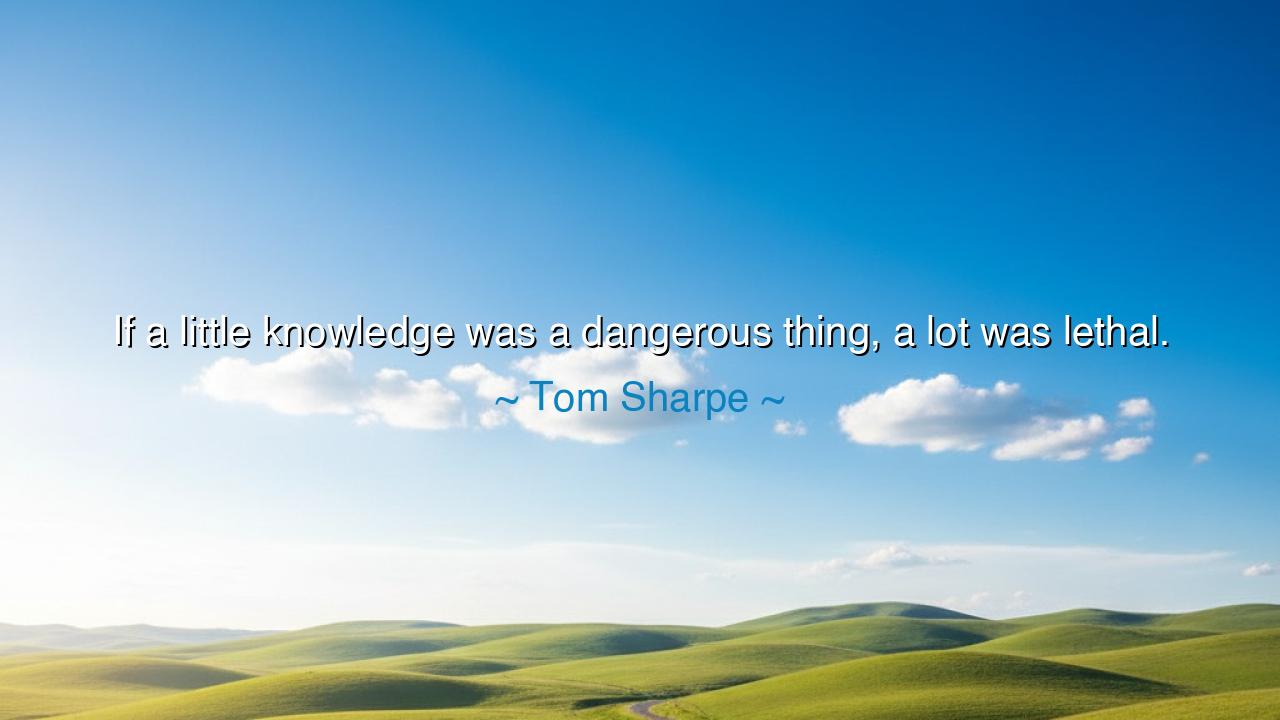
If a little knowledge was a dangerous thing, a lot was lethal.






“If a little knowledge was a dangerous thing, a lot was lethal.” — Tom Sharpe
In this sharp and sardonic reflection, Tom Sharpe, the English satirist and novelist, lays bare one of the oldest paradoxes of the human mind — that knowledge, though the root of enlightenment, can also become the seed of destruction. His words twist the ancient warning of Alexander Pope, who once wrote, “A little learning is a dangerous thing,” and carry it to a darker and deeper conclusion: that when knowledge grows unchecked by wisdom, it becomes not merely dangerous, but lethal. What Sharpe reveals is not a rejection of learning, but a caution against arrogance — the peril that arises when the mind expands faster than the heart can guide it.
The origin of this insight lies in the modern age, an era when knowledge multiplied beyond the control of those who wielded it. Tom Sharpe, through his biting satire, saw how intellect without humility could corrupt, how cleverness without conscience could destroy. He lived in a world where institutions, politics, and science often mistook knowledge for morality, and where the pursuit of progress sometimes trampled upon the very soul it sought to elevate. His quote echoes through the corridors of power and the halls of academia, reminding us that intelligence without virtue is like fire without restraint — capable of both illumination and ruin.
To understand his meaning, one need only look upon the story of Robert Oppenheimer, the father of the atomic bomb. Oppenheimer was a man of immense brilliance, a master of physics and a seeker of truth. Yet his knowledge, vast and wondrous, gave birth to a weapon that scarred the world. When he witnessed the first detonation of his creation, he whispered the words from the Bhagavad Gita: “Now I am become Death, the destroyer of worlds.” He had unlocked the deepest secrets of matter — but in doing so, he had opened the gates to unimaginable horror. His story is the perfect embodiment of Sharpe’s warning: that a little knowledge may mislead, but great knowledge without wisdom can annihilate.
This is the eternal struggle of mankind — to balance the light of the intellect with the guidance of the soul. For knowledge by itself is neutral; it is neither good nor evil. It is the intention of the one who wields it that determines its destiny. The same science that heals can kill; the same reason that builds can corrupt. The danger Sharpe speaks of lies not in learning itself, but in hubris, that ancient sin which blinds the wise and tempts them to play at being gods. When men believe they know too much, they forget the mystery that humbles them, and in that forgetting, they sow the seeds of their downfall.
History overflows with such lessons. The Roman Empire, rich in engineering, art, and philosophy, believed its knowledge made it invincible — yet it collapsed from within, undone by pride and moral decay. In the twentieth century, totalitarian regimes used education, propaganda, and science not to enlighten, but to enslave. They proved Sharpe’s truth in blood: that when knowledge serves power rather than truth, it turns from blessing to curse. Even in our own age, when humanity’s grasp reaches for the stars, we stand upon the edge of the same danger. Artificial intelligence, genetic manipulation, and the engines of war all carry within them the same duality — wisdom or ruin, depending on who holds them and why.
Sharpe’s warning, then, is not a condemnation of learning, but a plea for humility. For true knowledge must always be bound by ethics, and the mind must bow to the wisdom of the heart. It is not the quantity of knowledge that matters, but the quality of understanding — the recognition that to know the workings of the universe does not mean to own it. The wise man seeks not mastery over creation, but harmony within it. He knows that the more he learns, the more he must respect the vastness of what remains unknown. Wisdom, not knowledge, is what sanctifies the mind and protects the soul from self-destruction.
Therefore, dear seeker, remember this truth: pursue knowledge with passion, but wield it with care. Let every discovery deepen your sense of responsibility. Let your learning serve others, not your pride. Do not mistake cleverness for wisdom, nor information for insight. Before you act upon what you know, ask yourself whether it heals or harms, whether it enlightens or blinds. For in the age of knowledge, power comes swiftly — but wisdom must be chosen deliberately.
And so, let the words of Tom Sharpe echo within you like a solemn drum: “If a little knowledge was dangerous, a lot was lethal.” Let them remind you that the pursuit of truth must always walk hand in hand with the pursuit of goodness. For the mind that knows all things but loves nothing will one day destroy itself; but the mind that seeks to know with reverence, guided by compassion, will become the light that sustains the world.






AAdministratorAdministrator
Welcome, honored guests. Please leave a comment, we will respond soon